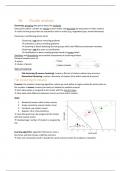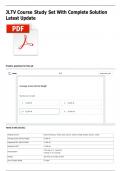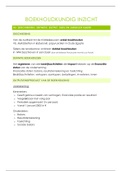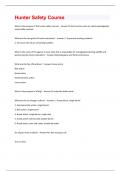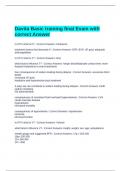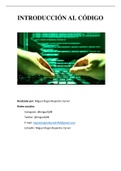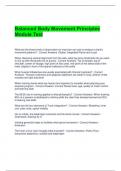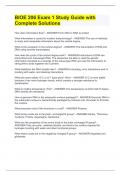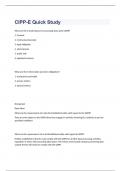Practical 11- Write-up Name: Lihansa Wimalaratne
Title: Production of a dilution series of a glucose solution and use of colorimetric techniques to
produce a calibration curve with which to identify the concentration of glucose in an unknown
‘urine’ sample.
Aim:
With the aid of a calibration curve that displays the absorbance values of known urine samples made
by serial dilution and use of Benedict's solution, the objective is to determine the glucose
concentration of an unknown urine sample.
Introduction:
Diabetes comes in two forms: Type I is inherited genetically, while Type II is brought on by unhealthy
lifestyle choices. Because it facilitates the conversion of glucose to glycogen (glycogenesis), insulin is
crucial for maintaining healthy blood glucose levels. When the body cannot produce enough insulin
or when the insulin does not function effectively, type II diabetes results. This occurs when the
body's cells' glycoprotein receptors become resistant to insulin and stop responding to high glucose
levels, which prevents all of the glucose molecules from undergoing glycogenesis. Due to the fact
that glucose is not reabsorbed into the bloodstream but rather excretes from the body through the
urine, diabetes individuals' urine samples often contain glucose.
It is feasible to determine the unknown content of glucose in a given urine sample by plotting a
calibration curve using known amounts. The specified urine sample's absorbance rate will be
determined by the colorimeter and plotted, allowing comparison to the other known glucose
concentrations. Addition of Benedict’s Solution causes glucose to reduce Cu 2+ ions in the Benedict’s
solution to insoluble copper (I) oxide, the solution changes from blue to brick red.
Equipment:
10 mmol dm-3 glucose solution
Distilled water
“Urine” samples of unknown glucose concentration
Benedict’s solution
Boiling tubes
Boiling tube rack
Water bath
Colorimeter
Cuvettes
Risk Assessment:
Hazard Risk Safety precaution In emergency Risk level
Benedict’s Irritant to skin Wear eye Wash eyes/skin Low
solution and eyes protection with cold water
Broken glass Cuts from Take care when Elevate cuts; Low
sharp object Handling glassware apply pressure;
do not remove glass
from wound
Hot liquids Scalding Handle with Run burn under Low
, care; use tongs cold water; seek
to remove medical assistance
boiling tubes from
water bath; wear
eye protection
Method:
Prepare urine samples for testing
1. Label the test tubes with the name of the patient and add 2 cm 3 urine samples from each patient.
2. To each test tube add 2 cm3 Benedict’s solution. Mix the contents of the tube.
Prepare the glucose calibration curve
1. Label six test tubes 0 to 10 mmol dm -3 as shown in the table below.
2. Dilute the glucose standard (10 mmol dm -3) with water in the labelled test tubes and complete the
table to show volumes used to achieve each concentration.
Concentration 0.0 2.0 4.0 6.0 8.0 10.0
of final
solution /
mmol dm-3
Amount of 2.0 1.6 1.2 0.8 0.4 0.0
water/ cm3
Amount of 0.0 0.4 0.8 1.2 1.6 2.0
glucose
standard /cm3
3. Add 2 cm3 of Benedict's solution to each tube. Mix the contents of each tube.
4. Place all the test tubes into the water bath together (including the tubes with the urine samples)
and time for four minutes. Allow to cool before taking readings from the colorimeter.
5. Use the contents of the 0.0 mmol dm -3 glucose solution tube, which you have heated with
Benedict's, as a blank to calibrate the colorimeter to zero absorbance. Place the remaining samples
in cuvettes into the colorimeter and read the absorbance.
6. Record your results in a table and plot a graph of the absorbance of the known concentrations of
glucose.
7. Using the graph and the absorbance values obtained for the urine samples read off from the graph
the concentration of glucose in the urine samples.
8. Record your results in a suitable table.
Title: Production of a dilution series of a glucose solution and use of colorimetric techniques to
produce a calibration curve with which to identify the concentration of glucose in an unknown
‘urine’ sample.
Aim:
With the aid of a calibration curve that displays the absorbance values of known urine samples made
by serial dilution and use of Benedict's solution, the objective is to determine the glucose
concentration of an unknown urine sample.
Introduction:
Diabetes comes in two forms: Type I is inherited genetically, while Type II is brought on by unhealthy
lifestyle choices. Because it facilitates the conversion of glucose to glycogen (glycogenesis), insulin is
crucial for maintaining healthy blood glucose levels. When the body cannot produce enough insulin
or when the insulin does not function effectively, type II diabetes results. This occurs when the
body's cells' glycoprotein receptors become resistant to insulin and stop responding to high glucose
levels, which prevents all of the glucose molecules from undergoing glycogenesis. Due to the fact
that glucose is not reabsorbed into the bloodstream but rather excretes from the body through the
urine, diabetes individuals' urine samples often contain glucose.
It is feasible to determine the unknown content of glucose in a given urine sample by plotting a
calibration curve using known amounts. The specified urine sample's absorbance rate will be
determined by the colorimeter and plotted, allowing comparison to the other known glucose
concentrations. Addition of Benedict’s Solution causes glucose to reduce Cu 2+ ions in the Benedict’s
solution to insoluble copper (I) oxide, the solution changes from blue to brick red.
Equipment:
10 mmol dm-3 glucose solution
Distilled water
“Urine” samples of unknown glucose concentration
Benedict’s solution
Boiling tubes
Boiling tube rack
Water bath
Colorimeter
Cuvettes
Risk Assessment:
Hazard Risk Safety precaution In emergency Risk level
Benedict’s Irritant to skin Wear eye Wash eyes/skin Low
solution and eyes protection with cold water
Broken glass Cuts from Take care when Elevate cuts; Low
sharp object Handling glassware apply pressure;
do not remove glass
from wound
Hot liquids Scalding Handle with Run burn under Low
, care; use tongs cold water; seek
to remove medical assistance
boiling tubes from
water bath; wear
eye protection
Method:
Prepare urine samples for testing
1. Label the test tubes with the name of the patient and add 2 cm 3 urine samples from each patient.
2. To each test tube add 2 cm3 Benedict’s solution. Mix the contents of the tube.
Prepare the glucose calibration curve
1. Label six test tubes 0 to 10 mmol dm -3 as shown in the table below.
2. Dilute the glucose standard (10 mmol dm -3) with water in the labelled test tubes and complete the
table to show volumes used to achieve each concentration.
Concentration 0.0 2.0 4.0 6.0 8.0 10.0
of final
solution /
mmol dm-3
Amount of 2.0 1.6 1.2 0.8 0.4 0.0
water/ cm3
Amount of 0.0 0.4 0.8 1.2 1.6 2.0
glucose
standard /cm3
3. Add 2 cm3 of Benedict's solution to each tube. Mix the contents of each tube.
4. Place all the test tubes into the water bath together (including the tubes with the urine samples)
and time for four minutes. Allow to cool before taking readings from the colorimeter.
5. Use the contents of the 0.0 mmol dm -3 glucose solution tube, which you have heated with
Benedict's, as a blank to calibrate the colorimeter to zero absorbance. Place the remaining samples
in cuvettes into the colorimeter and read the absorbance.
6. Record your results in a table and plot a graph of the absorbance of the known concentrations of
glucose.
7. Using the graph and the absorbance values obtained for the urine samples read off from the graph
the concentration of glucose in the urine samples.
8. Record your results in a suitable table.

